Living In Singapore: Pros & Cons You Should Know
Singapore is often described as a city that works, and it totally deserves its reputation. This small island nation in Southeast Asia has built one...

13 min read
Have you ever dreamt of owning a piece of paradise away from the hustle and bustle? A beach house in Panama or a mountain retreat in Colombia? You've heard success stories of high returns, idyllic lifestyles, and cautionary tales of legal complications and geopolitical uncertainties.
So, how can you ensure that your international investment portfolio doesn't turn into a costly mistake? Is it even possible to buy property abroad safely? The answer is yes! This article will guide you through the process with expert strategies, exploring tangible assets over stocks, considering the role of cryptocurrencies for diversification, providing information on upcoming webinars and trips for hands-on learning opportunities, and discussing potential risks associated with foreign properties.
Before we dive in, grab your complimentary copy of 19 International Strategies To Protect And Grow Your Wealth Abroad and join our newsletter to stay up-to-date with the best news and content from the offshore and expat world every week; you can learn more here.
In this article, we will discuss: Moving abroad, particularly to a country that values freedom, can be incredibly exciting. This comprehensive guide covers essential areas such as corporate structures for asset holding, immigration processes, and offshore financial and tax matters. It provides valuable advice on purchasing property overseas to ensure wise investments are made.
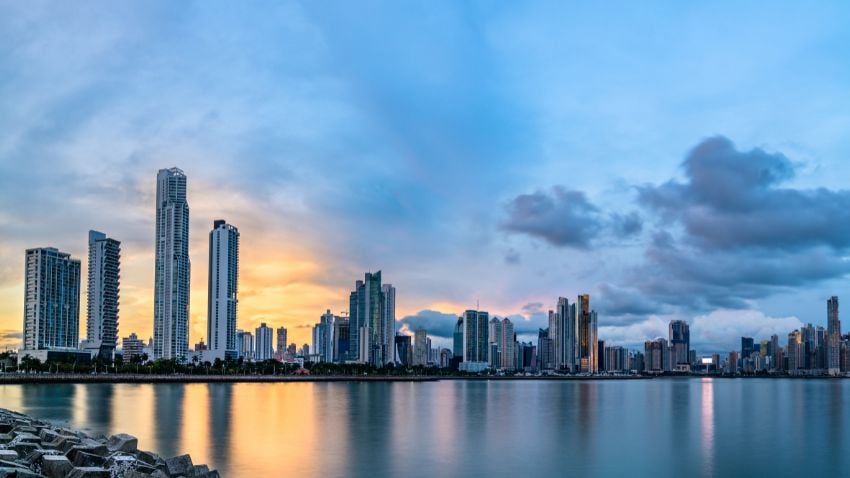
Panama City, Panama
I've crafted a distinctive approach to safeguarding wealth. My strategies center around diverse residencies and tangible asset investments in frontier markets. I focus on using corporate blockers to get assets out of my name. It's crucial to learn how to safely buy and hold real estate overseas, using it as a means to secure additional residencies for myself and my family.
I strongly believe in the power of geographical diversification. Having multiple residencies allows me to tap into varied opportunities worldwide. However, it's not just about economic prospects. Multiple residencies serve as a safety net against political instability or shifts in government policies that could adversely affect my wealth. I view it as an insurance policy for my assets across borders – hoping never to use it, but finding comfort in knowing it's there if needed.
Related article: What Is Flag Theory And How Can It Help You Secure Your New Life Abroad?
Investing in real estate overseas isn't just about expanding your portfolio or seeking higher returns. It's also a strategic move that can unlock doors to new golden visas, residencies and citizenships, offering you greater freedom, privacy, and legal tax reduction opportunities.
The path toward securing an additional residency or even dual citizenship often involves navigating through specific immigration programs offered by various countries. These programs are designed to attract foreign investors who contribute positively to the local economy while providing them with residency rights - a win-win scenario for both parties involved. Some popular examples include:
An excellent example of such a program is Panama’s Qualified Investor Visa Program, which is their version of a golden visa. This initiative allows individuals who invest $300,000 USD into Panamanian real estate (either directly or indirectly) to secure permanent residency within Panama. Moreover, after five years of continuous physical presence in the country and maintaining their investment intact during this period, they may apply for naturalization as Panamanians.
In South America, Brazil offers its investor visa, the VIPER visa, which stands for Permanent Foreign Investor Visa (Visto de Investidor Estrangeiro Permanente). Under this scheme, if you make an investment worth at least R$500k BRL ($125K USD), preferably in real estate, among other options – you qualify for Brazilian permanent residence status. For more information on how it works, check out Brazil Investor Visa.
Another interesting program to consider is Nicaragua's reforestation residency program. This unique scheme encourages foreign investors to contribute towards the country's environmental sustainability by investing in reforestation projects, and in return, they are granted permanent residency status. To learn more about this green investment opportunity, watch this presentation:
For more information on Nicaragua visas through investment in agroforestry, email: expat@ecovillages.life
Real estate investments overseas can be a powerful tool for securing additional residencies and citizenships while diversifying your portfolio.
In the investment realm, experienced investors like me are progressively redirecting their attention towards tangible assets. Unlike stocks and bonds, which can be influenced by market fluctuations, tangible assets such as real estate, agricultural land, and timber investments offer a level of stability that is difficult to overlook, but you have to learn how to buy and hold real estate overseas safely. Amidst the ever-evolving financial landscape, astute investors are increasingly turning their gaze toward tangible assets like overseas property. This trend is not merely a passing fancy; there are solid reasons why you should contemplate shifting your focus from stocks and bonds to more substantial investments. Here's why:
Unlike stocks and bonds, which can be volatile and unpredictable, real estate offers a steady income stream through rental yields. Even in times of economic uncertainty or market downturns, people will always need somewhere to live or conduct business.
Diversifying your portfolio with international real estate helps protect against fluctuations in any one asset class or geographic region. It also allows you to take advantage of growth opportunities worldwide while protecting yourself from domestic market volatility, which will help you learn how to buy and hold real estate overseas safely.
Owning property gives you direct control over your investment – something that simply doesn’t exist when buying shares in a company where decisions are made by board members who may not share your interests. Owning foreign properties, particularly those generating an income stream like rentals, provides even greater independence since they’re less likely to be influenced by local politics or economies back home.
Investing in overseas real estate can be an excellent way to diversify your portfolio while gaining exposure to foreign markets. It provides a hedge against inflation and has the potential for significant capital appreciation over time. Moreover, it's not just about buying property; you could also consider investing in commercial real estate or rental properties for steady income streams.
Agricultural land, on the other hand, offers both stability and growth potential. The demand for food will never cease, making this type of investment relatively safe from economic downturns. Plus, owning farmland gives you control over what is produced – whether crops or livestock – allowing you greater flexibility with your investment strategy.
Last but not least is timber investments. With increasing global demand for wood products due to population growth and urbanization trends worldwide - especially in emerging economies - investing in timber can provide attractive returns over time while contributing positively towards sustainable development goals, too!
My shift towards these tangible assets is a testament to their stability and growth potential. For libertarians and conservatives with an international view of the world, it's time to consider moving your wealth overseas for privacy, protection, legal tax reduction, and internationalization.
Related article: How To Use A Self-Directed IRA To Purchase International Real Estate
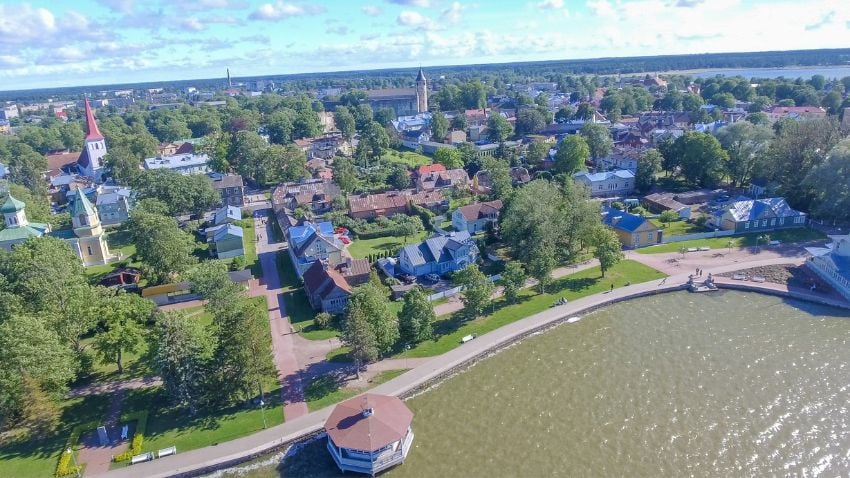
Haapsalu, Estonia
Purchasing property abroad involves its own challenges - different laws, unfamiliar property rights, language barriers and more. But with the right approach, you can navigate these hurdles successfully.
Before safely buying and holding real estate overseas, thoroughly research your chosen country's real estate market. Understand local laws related to property ownership and rental income taxes. Our consulting firm and free newsletter at Expat Money offer valuable insights into various international markets.
Hiring a reputable lawyer familiar with the local legal system is crucial when buying overseas properties as they can guide you through the process, ensuring all paperwork is correctly completed. However, finding a good lawyer to explain how to safely buy and hold real estate overseas can be challenging; it's one of the reasons people engage in our services; we work with lawyers in over 22 countries.
Currency fluctuations can significantly impact your returns on foreign investments, so it’s important to factor this risk into your financial planning strategy.
Real estate has long been a favoured asset class for me. The rationale behind this is simple: properties are physical entities that aren't as susceptible to market fluctuations as stocks. Plus, they have an intrinsic value - people will always need places to live and work.
But there's more than just inherent worth at play here; it's also about generating steady cash flow through rental income or appreciation over time. Property can be an incredibly lucrative investment vehicle for those willing to put in the effort.

The Luxembourg Palace
As an international-minded investor, you must consider diversifying your portfolio beyond traditional investments. One way to do this is by holding 5-10% of your portfolio in foreign currencies such as the Swiss Franc (CHF), Singapore Dollars (SGD), and the Cayman Island Dollar (KYD). Here are five compelling reasons why.
Diversification is a fundamental investment principle that helps reduce risk. Investing in different types of assets can protect you against significant losses if one asset class performs poorly. Holding foreign currencies provides an additional layer of diversification for your portfolio.
Currency risk refers to potential losses from fluctuations in exchange rates. If you hold all your wealth in one currency and it depreciates significantly, it could erode the value of your investments. Investing a portion of your portfolio into stable foreign currencies like CHF or SGD offers a hedge against this risk.
If you choose wisely, investing in certain foreign currencies can provide attractive returns over time due to economic growth and interest rate differences between countries.
According to the Bank for International Settlements, the forex market is the most liquid financial market globally, with trading volumes exceeding $6 trillion USD per day. This means investors can easily buy or sell foreign currencies without significantly impacting the price.
Holding foreign currencies can provide access to investment opportunities in those countries. For example, if you hold SGD, you could invest in Singapore's thriving real estate market or its robust stock exchange.
In a world of increasing economic uncertainty and financial instability, holding foreign currencies is an effective strategy for preserving wealth and achieving long-term financial goals. Start considering this approach today as part of your internationalization efforts.
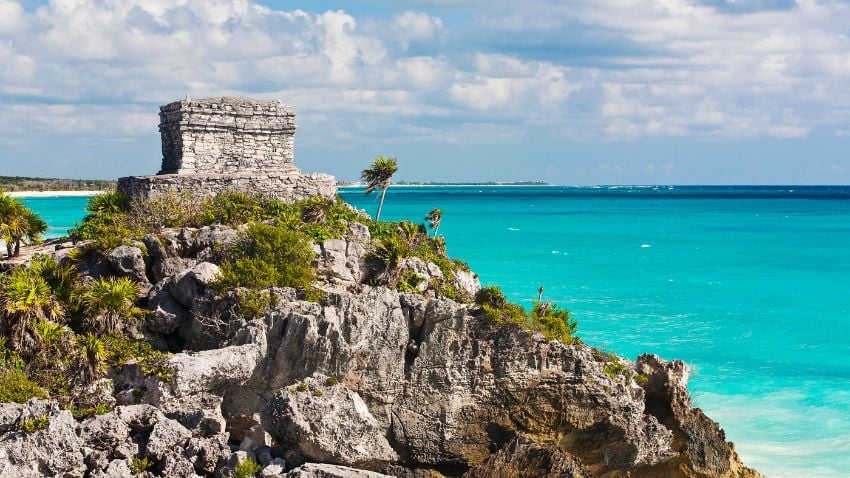
Tulum, Mexico
Diversification isn't only confined to tangible assets; cryptocurrencies have also found their place in an international portfolio. Particularly Bitcoin, which offers another level of separation between investor identity and funds owned.
Intriguingly enough, though, despite being so heavily into 'real' assets, I still see merit in investing digitally, given how cryptocurrencies have shaken up traditional finance paradigms. I see Bitcoin as a viable alternative asset that offers equal privacy and growth potential.
Regarding investment portfolios, diversity is the name of the game. Spread investments across a range of different assets rather than just one. One such asset that's making waves these days is cryptocurrency.
Cryptocurrency, especially Bitcoin, has been the talk of the town in recent years. But as an investor looking for diversification, you might question, “How much weightage should be given to this digital currency?”
Bitcoin can act like gold during times of economic uncertainty due to its finite supply - a factor contributing to its 'digital gold' moniker. It offers an alternative hedge against inflation, which traditional investments may lack.
A balanced portfolio could have about 5% allocated towards cryptocurrencies (Fortune). However, each individual’s risk tolerance varies; some investors are more comfortable with higher volatility than others.
Diversify within Crypto: There are thousands of cryptocurrencies out there apart from Bitcoin - Ethereum and Solana being popular ones among them;
Safety Measures: Security measures like keeping crypto wallets encrypted and storing private keys offline can help safeguard your investments from hacks;
Regulation Awareness: Stay updated on the legal landscape of cryptocurrencies in your country, as it can impact their value and liquidity.
The key takeaway here is to balance Bitcoin and other investments effectively. It's about diversifying within traditional assets and expanding horizons towards newer asset classes like cryptocurrency.
Related content: Top 7 Crypto Friendly Countries In The World
As a freedom-loving libertarian or conservative with an international view, privacy and sovereignty are paramount. This has led to many seeking investment opportunities that yield good returns and offer the utmost discretion. Enter cryptocurrencies and Bitcoin – your ticket to achieving these goals.
Cryptocurrencies are digital assets designed to work as a medium of exchange wherein individual coin ownership records are stored in a ledger as a computerized database using a strong cryptography source. The decentralized nature of blockchain technology ensures transactions remain private, secure, and untraceable by any central authority or government institution.
Bitcoin (BTC), the first established cryptocurrency, offers you control over your money with its pseudonymous aspect. While it’s true that every transaction can be traced back through the blockchain network - which adds transparency - identifying individuals behind those transactions is nearly impossible without their consent.
Digital currencies like Bitcoin allow investors complete control over their wealth. Unlike traditional banking systems, where funds can be frozen or controlled by external entities such as governments or banks, cryptocurrencies give you full autonomy over your financial source.
Maintaining 5% of your offshore portfolio in cryptocurrencies could prove beneficial for several reasons:
Risk Management: Investing across different asset classes helps spread risk. In case one investment doesn't perform well, others may offset the losses;
High Returns: Cryptocurrencies have shown potential for high returns despite their volatility. Bitcoin, for example, has had a remarkable return on investment since its inception;
Diversification: Including cryptocurrencies in your portfolio can benefit diversification due to their low correlation with traditional asset classes.
Incorporating digital assets into an international investment strategy is not just about financial gains; it's also about maintaining privacy and control over one’s wealth – ideals close to the heart of every libertarian or conservative investor seeking global opportunities.
Related article: How US Citizens Can Reduce Their Crypto Tax Bill

Chateau Chillon Castle, Switzerland
Subscribe to our podcast for insights into the lucrative world of international investment. Our work not only arranges these informative podcast episodes but also ensures participants get to network with like-minded individuals at our live events, opening doors to potential partnerships.
A promising avenue for investment. Despite their volatility, he believes in the potential of digital currencies due to their decentralized nature and growth trajectory. His forward-thinking approach also extends to utilizing blockchain technology in real estate transactions - a revolutionary concept that could redefine property ownership.
Our webinars are not just talks; they provide a chance to become engaged in an educational experience that links you with authorities on international real estate. These online events give you insights into different projects around the world from the comfort of your home.
We tackle key topics such as legalities, tax implications, potential returns, and practical tips for buying property abroad. Think of these sessions as your gateway to untapped markets – a kind of secret weapon, if you will.
In addition to our informative webinars, we arrange trips to various destinations that offer promising investment prospects. Nicaragua is renowned for its attractive tax policies, while Colombia boasts a fantastic lifestyle and pleasant climate. Uruguay has one of the most stable economies in Latin America.
Panama, on the other hand, has become a popular choice among expats due to its favourable immigration laws and excellent quality-of-life offerings. Our trips provide participants with firsthand experience of living in these locations and an opportunity to meet local professionals who can offer valuable advice on investing in the property market. Whether you are new to overseas investments or an experienced investor looking to diversify your portfolio, we have got you covered. Join us as we explore new possibilities for real estate investment and stay at the forefront of this ever-evolving industry.
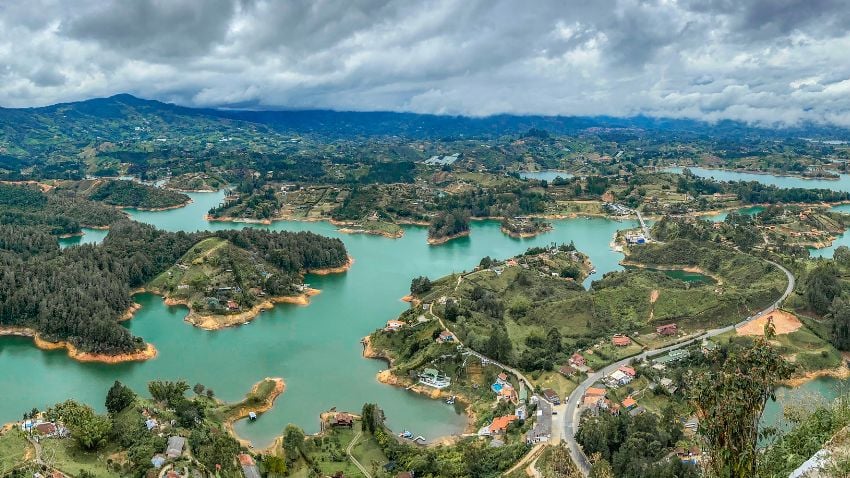
Peñol Stone in Guatape, Colombia
Investing in overseas real estate can be a lucrative venture, but it comes with challenges. One such challenge is ensuring your assets are adequately protected and structured for maximum efficiency. This is where the use of corporate structures comes into play.
A corporate structure allows you to hold your investments under a legal entity separate from yourself as an individual. It provides multiple benefits, including privacy, asset protection, and efficient estate planning.
My advice is to own real estate within structures that protect privacy while separating personal assets from your business ones. This might sound complicated, but think about it this way:
You wouldn’t keep all your money under one mattress, would you? Just like you shouldn’t hold all your wealth within one country’s jurisdiction either.
This strategy reduces exposure should legal disputes arise while safeguarding financial privacy – essential elements when dealing with significant sums invested overseas.
Nominee Services: Nominee services offer increased privacy by acting on behalf of the actual owners in public records. This means that personal information about the beneficial owner remains confidential;
Title Deed Holding: The corporate structure should hold the title deed to ensure that ownership rights are vested within this legal entity rather than individuals involved;
Trusted Lawyer or Service Provider: Engaging with a trusted lawyer or service provider who specializes in administering offshore corporations will help you navigate complex international laws and regulations effectively;
Estate Planning Considerations: Your corporation's setup should align with your long-term wealth management strategy, including succession planning and inheritance considerations;
Litigation Protection: An offshore corporation makes it more difficult for others to sue you personally or for your home government to seize assets held abroad due to its limited jurisdiction over foreign entities.
In essence, setting up an appropriate corporate structure when investing overseas shields you from potential risks while maximizing financial gains. However, remember each country has different rules regarding property ownership by foreign corporations. Therefore, conducting thorough research or consulting with a professional is essential before making your move.
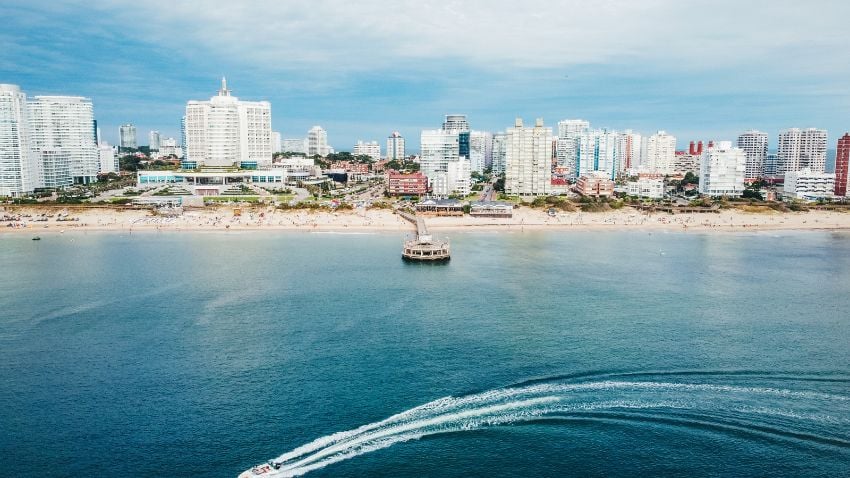
Punta del Este, Uruguay
Betting on overseas real estate can be a lucrative venture, but it's not without its risks. The potential pitfalls can make your dream investment into a financial nightmare if you're not careful.
The first risk to consider is geopolitical instability. Changes in government policies or political unrest could significantly affect property values and investment returns. For instance, an unexpected change in land ownership laws might result in a sudden loss of rights for foreign investors.
You must stay informed about local politics and economic trends via trusted news sources. You should also consider seeking advice from local experts who understand the ins and outs of the country’s legal system better than anyone else.
Economic volatility is another key concern when investing abroad. Exchange rate fluctuations between currencies can erode profits quickly or increase your cost basis unexpectedly.
To mitigate this, you may want to keep part of your investment funds in stable international currencies like US dollars or Euros, which tend to fluctuate less dramatically than emerging market currencies. Online currency converters can help track these changes so you’re never caught off guard by swift shifts in value.
The liquidity risk – how easy (or difficult) it will be for you to sell your property once bought. In some markets with fewer buyers, selling real estate might take longer than expected - a time during which its value could decrease substantially due to market dynamics.
Consider locations with a robust real estate market and high demand to manage this. Engage in detailed research on local property trends before making your investment decision.
The tax implications associated with owning properties overseas should never be underestimated. Various countries have different taxation systems that could affect overall profitability from rental income or capital gains when selling these assets later down the line. Consulting a knowledgeable tax advisor could save you thousands in unnecessary taxes over time while ensuring compliance within respective jurisdictions.
Understanding the legal framework surrounding foreign real estate ownership is another critical aspect often overlooked by many investors. Understanding the rules around owning land in a foreign country can be tricky for expats. Each country has its own rules concerning land ownership, construction regulations and zoning laws. It’s essential to consult with experienced lawyers or consultants familiar with both domestic and international law concerning property rights before finalizing any purchase agreements.
Lastly, venturing into foreign property markets isn't always straightforward. You must grapple with unfamiliar territory - laws, cultural nuances and sometimes language barriers. So, while the rewards can be great, remember that it's essential to do your homework before jumping in.

San Juan del Sur, Nicaragua
Yes, buying overseas property can offer great returns and diversification. But do your homework first - know the market and legalities.
Absolutely. US citizens can legally purchase properties globally. However, local laws and tax implications must be considered carefully.
The process varies by country; some make it easy for foreigners, while others pose challenges. Researching the specific location's regulations is key. Read our blog for more insights.
Sadly, not many U.S. banks provide mortgages for overseas properties due to complex international lending rules. Seek out specialist lenders or consider home equity loans instead.
Most banks will not give financing to foreigners, especially if you are yet to secure your permanent residency. A good option is to speak directly to the developer about them providing financing. At Expat Money, we have helped many clients secure financing for a new home or investment property.
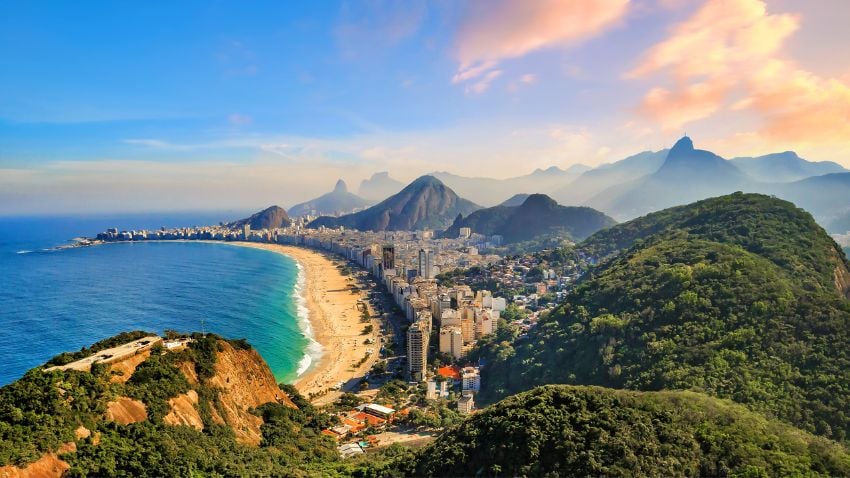
Copacabana Beach and Ipanema Beach in Rio de Janeiro, Brazil
Successfully purchasing and holding real estate overseas is a feat that not only requires strategic planning but also an understanding of the local market dynamics. This journey can be daunting, especially for libertarians and conservatives with an international perspective who value their privacy, financial protection, legal tax reduction and globalization.
The first step towards this endeavour involves identifying viable property markets abroad. Research on economic stability, growth prospects, political climate, and social factors such as crime rates are crucial in making informed decisions.
In addition to due diligence on your chosen location's viability for investment purposes, it's equally important to consider how you will manage your properties once they're purchased. Employing a reliable property management company can ensure smooth operations while providing peace of mind, knowing your investments are properly handled.
To wrap up, buying and holding real estate overseas offers numerous benefits if done correctly – including diversification of portfolio risk through exposure to various economies around the globe. However, this process requires careful planning and a good understanding of local market conditions to avoid potential pitfalls.
If you want the best intel from the expat world, including profitable offshore opportunities, little-known tax-saving strategies, and hard-won insights on immigration, passports, and Plan-B residencies, all delivered to your inbox every single week, then join our daily correspondence, EMS Pulse®. Currently enjoyed by over 84,000 expats and expat-hopefuls worldwide. Fill in the form below to join our newsletter free:

Written by Mikkel Thorup
Mikkel Thorup is the world’s most sought-after expat consultant. He focuses on helping high-net-worth private clients to legally mitigate tax liabilities, obtain a second residency and citizenship, and assemble a portfolio of foreign investments including international real estate, timber plantations, agricultural land and other hard-money tangible assets. Mikkel is the Founder and CEO at Expat Money®, a private consulting firm started in 2017. He hosts the popular weekly podcast, the Expat Money Show, and wrote the definitive #1-Best Selling book Expat Secrets - How To Pay Zero Taxes, Live Overseas And Make Giant Piles Of Money, and his second book: Expats Guide On Moving To Mexico.
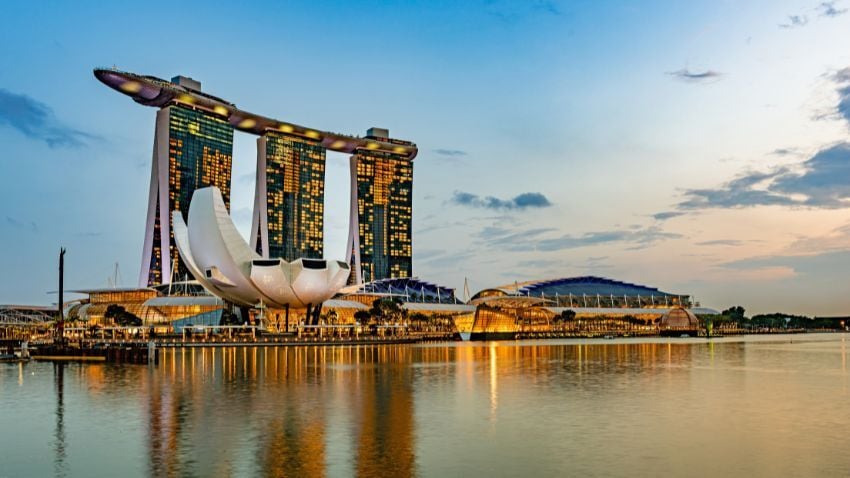
Singapore is often described as a city that works, and it totally deserves its reputation. This small island nation in Southeast Asia has built one...

Panama’s geographic size is modest, but its global relevance is not. The country connects two oceans and two continents, operates on a dollarized...

Honduras’ newly elected president, Nasry Asfura of the conservative National Party, was sworn in on January 27, 2026. The election, held on November...